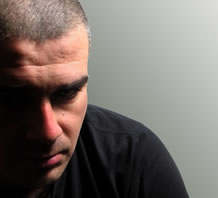What Is Postnatal Depression?
Learn All About Postnatal Depression In Just 10 Minutes...
What is postnatal depression and how can you beat it? You can get advice about postnatal depression from your GP, the NHS or from private providers such as specialised charities or clinics. Postnatal depression is serious and can quickly become a debilitating condition. This can place parents and babies in potential danger if the situation is not correctly addressed. Fortunately postnatal depression can be effectively managed and quickly overcome with the right help. Only a minority of sufferers require prescription medication such as anti-depressants, although unfortunately these drugs are commonly over-prescribed by GP's. A far better solution (and one without unpleasant side effects or the worry of addiction) is to choose a specialised clinic such as ours to help you. Our specialists are trained to work 'drug free' making your recovery safer for both you and your baby.
What Causes Postnatal Depression?

Postnatal depression was originally assumed to be caused exclusively by hormonal changes following childbirth. However, many studies have proven this theory to be incorrect. In truth, postnatal depression is almost certainly caused by a number of factors which can include:
- Hormonal changes
- Stress and anxiety
- Social pressure
- Unrealistic expectation leading to not feeling good enough
- Over-thinking or dwelling
- Physical and emotional exhaustion
- Lack of sleep
- Resource problems (space, time, money, etc)
- Relationship stress (with partner, other children, family or friends)
It is certainly not necessary to experience all of the above in order to have postnatal depression. As a rule of thumb if you feel you have been suffering from the symptoms of postnatal depression for two weeks or more - there is a good chance you have it.
Who Can Be Affected By Postnatal Depression?

The simple answer is pretty much anyone can be affected by postnatal depression. It makes sense that the majority of sufferers of postnatal depression are new mothers. However, it is not uncommon for a mother to have no signs of postnatal depression with her first child, but may then have it with a subsequent child.
Thus it would follow that being affected by postnatal depression is a bit of a lottery. A positive way of looking at this fact is that having postnatal depression is NOT your fault. Having postnatal depression is never a sign of weakness or that you're a bad person - it simply doesn't work that way. Rather, it's just something that happens to some people when they have a new baby in their life... and it can be easily fixed!
Postnatal depression can also affect men. The figure may be as high as one in ten men suffering with postnatal depression. The fact that men suffer with postnatal depression too supports the stance that it can't be caused by hormonal changes alone.
If you re-read the list of causes of postnatal depression you'll see that (with the exception of hormonal changes) men can be affected by all of the other factors. As with women, when a man suffers with postnatal depression - it's not his fault. Many men shy away from asking for help believing it shows weakness or inadequacy. However, to the contrary, getting help is the smart and responsible thing for a father to do. A new baby needs its parents to be 'on the ball' so we each owe it to our partner and our little one(s) to get help when we need it.
What Factors Can Antagonise Postnatal Depression?

We have already outlined several potential causes of postnatal depression. Each of these factors can potentially antagonise the condition. So for example, a new mother with unreasonably high expectations of herself could well feel frustrated by the fact that motherhood isn't going as perfectly as she'd planned. Feeling tired through a lack of sleep can again antagonise postnatal depression and our associated emotional responses making them more severe then they would otherwise be. Tiredness can also put strain upon relationships within the family as we tend to be more defensive and are more likely to feel as though we are being judged when our sleep requirements are not met.
Another very common factor with postnatal depression is that of self-judgement. Over-thinking and paying attention to the smallest detail, then blowing its importance out of proportion is a trait demonstrated by many sufferers of postnatal depression. New parents tend to try VERY hard to get everything right. However, rather than focusing on the 98% they do well for their baby - they repeatedly crucify themselves for the 2% they think they could have done better.
This can sometimes lead to an emotional shutdown where the parent feels detached or separated from their baby. They find it difficult to feel close or loving as a result. Some feel guilty and label themselves as bad or uncaring, but this is just part of the postnatal depression process. Others simply wish to escape away from their baby which again can be characteristic of PND. None of these things needs to be a long term problem for you, nor do they mean you are a bad person or parent. Postnatal depression can be quickly worked through with the right specialised help. You owe it to your baby and the rest of your family to get it sorted out now.
How Long Can Postnatal Depression Last?

Postnatal depression as a rule of thumb needs to have been present for at least two weeks in order to be formally diagnosed (and to separate it from the more common Baby Blues).
For the majority of sufferers it seems that postnatal depression lasts for at least several months and in some cases (without the correct specialised help) can last for years. Some parents try to bury their heads in the sand, do nothing and hope it'll go away on its own. Unfortunately that's why postnatal depression can last for so long.
Whether you've been suffering with postnatal depression for a few weeks, many months or even a year or more - NOW is the time to get it sorted out. There is no way of knowing how long it will persist if you bury your head in the sand and do nothing to help yourself.
Does Postnatal Depression Go Away On Its Own?

As discussed in the previous section - postnatal depression can last anything from weeks to years.
Sometimes a change in circumstances is all it takes to cause the depression to right itself. For example, a baby starting to settle into a regular sleeping pattern allowing you to have adequate rest can cause a big change in how you feel if sleep deprivation was a pivotal factor in your postnatal depression.
However, if your postnatal depression is driven internally by factors such as you feeling that you're not good enough, are a poor parent, can't care for your baby correctly (etc) - then it is unlikely this perspective will change on its own. If the perspective remains... so does the postnatal depression.
Thus the factor(s) maintaining your postnatal depression has huge influence on the likelihood of it going away naturally. Most long term sufferers of postnatal depression find they are 'over-thinkers' and feel they have low confidence. This represents the largest group of postnatal depression sufferers we work with... and the vast majority recover relatively quickly with our help.
How To Manage & Overcome Postnatal Depression Effectively...

Here at the Anxiety Clinic we're realistic and down to earth. We understand that babies take a lot of looking after, require lots of attention and simply refuse to sleep on command. This is why part of your recovery will be down to management and making the best of what you have. If your baby is pretty much typical and wont fall asleep on command or sleep through for eight hours - you need to manage what you can't control.
However, much of postnatal depression is actually driven and maintained by your perspective of what is going on, how you are performing and how you're feeling emotionally. This we can change very quickly with our expertise. The truth is that any form of depression actually causes temporary physical changes in the way the brain functions. This means that your ability to rationalise or 'make sense' of situations can become severely compromised. Think of it like this:
Have you ever been so angry about something you could scream? Remember that time now and recall the decisions you made whilst you were in that intensely angry emotional state. Pretty lousy decisions right? Have you ever felt intensely jealous over someone? Remember that time now and recall your decisions and behaviours from back then. Again, pretty lousy right?
The reason we make lousy decisions (and commonly don't see reality for what it is) when we're experiencing intense emotional states is that a different part of our brain takes over. Our thoughts, decisions and behaviours are dictated by a part of the brain which simply doesn't do well with rationalisation. Basically when we're in an intense emotional state the top part of our brain (which normally deals with logic and rationalisation) shuts down and the bottom emotional part of the brain (renowned for making lousy decisions) takes over.
When you have any type of depression this change-over not only happens... but it also sticks. Intense emotional feelings coupled with a distorted view of reality and poor decision making abilities serves to maintain the depression. Basically it runs in a cycle with one thing maintaining another. See - we told you it wasn't your fault!
We specialise in working with the mind and can help you to re-engage the rational part of your mind whilst taking control of the emotional roller-coaster you've been clinging onto for so long. It's really no big deal, the process is straightforward and works fast. So if you're fed up with crucifying yourself and want to be the best parent you can be, simply give us a call and have a chat with one of our Consultants. Our number is 01782 855585 and we're open until 9pm seven days a week.
If you'd like more information on how we work and our very affordable fixed rate fees - choose from the following links:
I live near to Stoke on Trent, Staffordshire and am interested in a Face To Face Consultation at the Anxiety Clinic
I can't make it to Stoke on Trent so an Online Consultation would work better for me.







